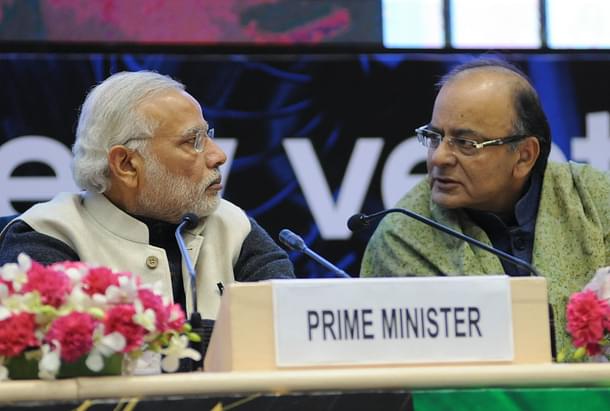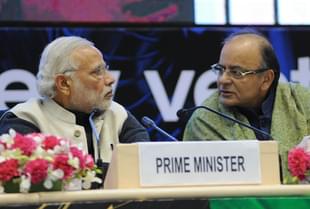Economy
Ease Of Doing Business Rankings: Testament To Modinomics As India Jumps 30 Places
Swarajya Staff
May 17, 2018, 05:04 PM | Updated 05:04 PM IST
Save & read from anywhere!
Bookmark stories for easy access on any device or the Swarajya app.


In a big thumbs-up to Prime Minister Narendra Modi’s economic policies, India has jumped up 30 spots in the World Bank’s Ease of Doing Business Report that was released today (31 October). India now finds itself ranked at the hundredth place as opposed to 130 in last year’s report.
India stands out this year as one of the 10 economies that improved the most in the areas measured by Doing Business.Ease of Doing Business Report, 2018
The report ranks New Zealand, Singapore and Denmark as the top three countries by ease of doing business. Ranked at 78 – 22 places ahead of India – China has not improved its ranking. India’s ‘Distance to Frontier’ (DTF) score increased by 4.71 points to 60.76, against China’s increase of 0.40 points. The DTF score helps assess the absolute level of regulatory performance over time. It measures the distance of each economy to the “frontier,” which represents the best performance observed on each of the indicators across all economies in the Doing Business sample since 2005.
Finance Minister Arun Jaitley said that India's 30-place elevation is the highest jump that any country has ever made in the index. He also said that it was a clear and big acknowledgement of the structural reforms that Modi government has been undertaking and that inn the last 3 years, the government has been making efforts to simplify procedures which led to improvements in many areas.
India saw the biggest jump in the criterion of paying taxes, moving up 53 places on the back of improvements to the taxation system.
A study on India, for example, shows that inefficient licensing and size restrictions cause misallocation of resources, reducing total factor productivity by preventing efficient firms from achieving their optimal scale and allowing inefficient firms to remain in the market. The study by the World Bank showed that removing these restrictions would boost total factor productivity by an estimated 40-60 per cent. India also streamlined the business incorporation process by introducing the SPICe form (INC-32), which combined the application for the Permanent Account Number (PAN).
Appreciating India’s new insolvency law as well as the zeal to resolve non-performing assets (NPAs), the World Bank had the following to say.
India also strengthened access to credit by amending the rules on priority of secured creditors outside reorganization proceedings and adopting a new insolvency and bankruptcy code that introduced a reorganization procedure for corporate debtors. In India the establishment of debt recovery tribunals reduced non-performing loans by 28% and lowered interest rates on larger loans, suggesting that faster processing of debt recovery cases cut the cost of credit.
This can be considered as an endorsement of Prime Minister Narendra Modi’s economic policies – Modinomics – which saw the nationwide roll out of a drastically new tax regime in the form of the Goods and Services Tax as well as the demonetisation of high value notes last year.
The World Bank also complimented India for easing tax compliance on businesses due to the implementation of an online platform for the payment of the Employee Provident Fund as well as the introduction of administrative measures to ease income tax compliance.
So what did India do in the last financial year that caused such a massive change?
Setting up a business was made easier by merging the applications for a Permanent Account Number (PAN) and Tax Account Number (TAN) as well as improving the online platform for applications. Mumbai merged the applications for Value Added Tax (VAT) and Professional Tax (PT) which helped further.
Easier construction permits, by simplifying the procedure to obtain a building permit with an online system in Greater Mumbai and New Delhi.
Access to credit was strengthened by amending the rules on priority of secured creditors outside reorganisation proceedings and the new insolvency law that provides a time limit and clear grounds for relief to the automatic stay for secured creditors.
Protections for minority investors were strengthened with more remedies available in cases of prejudicial transactions between the transacting parties.
Easier Tax Payments by requiring Employees Provident Fund payments to be electronic, and introducing administrative measures making it easier to comply with corporate income tax rules.
Trade across state borders was made quicker by reducing the time taken to comply with import regulations at Nhava Sheva port. In Delhi and Mumbai, eliminating merchant overtime fees and an increase in electronic and mobile platforms compliance of both export and import regulations.
Enforcing contracts with the the introduction of the National Judicial Data Grid (NJDG) in Mumbai and Delhi made it easier to enforce contracts because local courts can now generate case management reports.
Resolving insolvency with the new insolvency and bankruptcy code that introduced a reorganisation procedure for corporate debtors and enabled continuation of the debtor’s business even during insolvency proceedings in Mumbai and Delhi.





